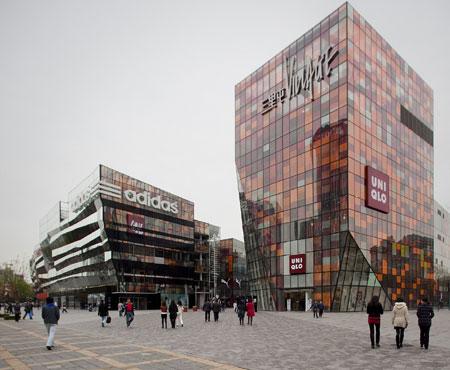
Pedestrians walk outside Sanlitun Village commercial development in Beijing. China's invested stock will exceed $1.38 trillion by 2010, according to a DTZ report. Nelson Ching / Bloomberg news
Property service provider DTZ predicts rapid Asia-Pacific growth
BEIJING - China will surpass both the UK and Japan to be the world's second largest property investment market by 2011, a report by international real estate service provider DTZ said on Tuesday.
The report forecasts that invested stock for 2010 in the Asia-Pacific region will increase by 12 percent to $3 trillion, on the back of a continued recovery in capital values. Invested stock refers to the value of investment grade commercial real estate held by different investor groups.
Underlying the strong trends for the region is the persistent growth in China's property market, which more than offsets a decade-long weakness in Japan.
"We expect this trend to continue and reach a milestone in 2011, with China overtaking Japan to become the largest property market in the Asia-Pacific region and the second largest market worldwide," said Hans Vrensen, global head of research of DTZ.
The report showed that China's invested stock will exceed $1.38 trillion by 2010, behind the US's $3.88 trillion market. In 2009, China's figure was $858.7 billion, behind the US's $3.7 trillion and Japan's $1.25 trillion.
The rapid rise has been driven by strong economic growth and complemented by the opening up of the Chinese property-investment market to domestic and foreign investors.
"This is a remarkable trend for a market that did not feature in the global top five in 2007," Vrensen said.
Taking a closer look at invested stock on a country level, invested stock in the Asia-Pacific region is dominated by three markets: Japan, China and Australia. They account for 81 percent of the total invested stock in the region.
"Looking at the markets in Asia-Pacific in more detail we can see that there are current opportunities for investors across all three sectors with office and retail looking particularly attractive at this point. And more than 80 percent of Asia-Pacific property markets are traded currently at or below fair value," said Vrensen.
Chinese and Indian cities dominate the "hot" and "warm" categories although there are also opportunities in the more mature, developed locations such as Sydney offices and Singapore retail, the report showed.
According to Grant Ji, director of Savills (Beijing), a UK-based real estate service provider, foreign institutional investors have been much more active in seeking opportunities this year because of better lending environment overseas.
"But this time, they are more interested in joining hands with local developers and even taking part in the development stage. Moreover, they are interested in tapping the second- and third-tier cities," said Ji.
UBS Global Asset Management announced in April that it had successfully concluded the first closing of its joint-venture with Gemdale Corporation, a leading listed real estate developer in China. It will invest in residential development projects in first-tier and selected second-tier cities in China.
In mid-March, China Overseas Land & Investment Ltd, together with ICBC International Investment Management Ltd, set up a $250 million real estate fund to invest in China's property market.





